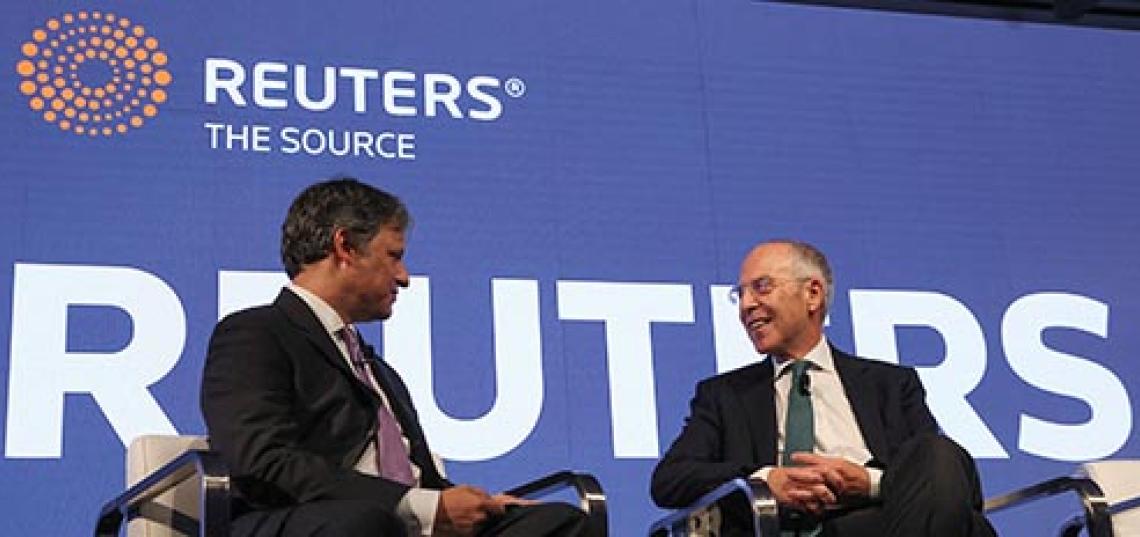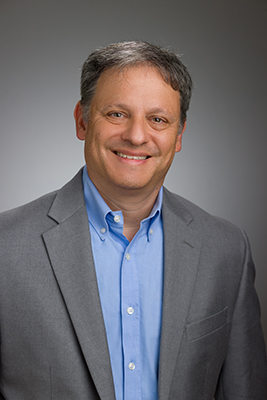
For more than 25 years, financial journalist David Gaffen JMS’95 has reported for major publications including the Wall Street Journal and Registered Rep, and during the last 15, Gaffen has worked for Reuters.
Since 2023 Gaffen has been the breaking news editor for business stories at Reuters, where he said he “covers anything within the big world of business that is going on at the moment. I have to be in front of the biggest stories of the day, with an understanding of what our coverage plan is, what we’re publishing, what’s getting out onto the wires to our big media clients.”
Since his days as a Rutgers student, Gaffen has gained a unique insider’s perspective into the ways the practice of journalism has changed over time. Recently he shared his insights at SC&I as one of four alums who participated on the panel “How SC&I Graduates are Using Artificial Intelligence Beyond Rutgers” during the SC&I Teaching Incubator “Teaching in the AI Era” held in March 2025.
In our interview, Gaffen tells SC&I about his current work, the skills and knowledge he gained at SC&I that he continues to use on the job today, his thoughts about AI, including his advice for current SC&I students as they consider using AI, and more.
 Tell us about yourself and a typical day as the Breaking News Editor for Companies News for Reuters.
Tell us about yourself and a typical day as the Breaking News Editor for Companies News for Reuters.
DG: I do a lot of coordination across teams, so I’m talking with reporters in New York, Washington, San Francisco. What I’m trying to do is both make sure that we have something that is comprehensive and well written and points towards whatever the next new developments are. It’s a lot of coordination and it’s fast moving, so there’s a stress element to it as well. But overall, it’s amazing.
How did your previous experience as Editor in Charge and News Writer at the Wall Street Journal prepare you for your current role?
DG: When I first got to the Wall Street Journal, I was doing a lot of rewriting and repurposing copy to get a copy on the Journal website. Sometimes this meant taking published stories and cutting them down, making them a little shorter, catching mistakes here and there. While I was still at the Wall Street Journal, I got the opportunity to start blogging, which was the big new thing at the time.
I started doing a blog called the MarketBeat blog, and I would post regularly; every 45 minutes to an hour and a half. It got me into the habit of what I do now, which is a lot of writing fast. That was one of the building blocks that got me to where I am today.
What knowledge did you gain as a Journalism and Media Studies major at Rutgers that you still apply to your work today?
DG: I learned to keep my writing concise. Journalists can do what’s known as “overwriting,” adding words they don’t need, instead of keeping their writing punchy, straightforward, and simple. Becoming a clear and direct writer was among the most important lessons I learned at Rutgers.
Has AI changed the way you work, or do you avoid it as a journalist?
DG: There’s a layer of complexity now in trying to figure out what is and isn’t AI and understanding how journalists can embrace it. Using AI requires a significant level of scrutiny. At Reuters we’ve started to use AI to do some editing, for example to create lists of bullet points to add to the beginning of stories as summaries. The more I see how AI impacts the creative process, the less interested I am in AI. AI must operate with a human handbrake.
What advice would you give SC&I students regarding AI?
DG: Don’t set aside creative work in favor of using AI as a tool that just gets the job done more swiftly. AI can easily make mistakes. AI can’t talk to people, it can’t get scoops, it can’t go out into the field, it can’t pick up the phone. These are skills journalists still need to use.
Business is important, and I imagine that people are feeling a little raw, because it’s a time when journalism is being attacked very heavily. There’s the desire to use AI to find a way to cut a path through so you can please everybody. That’s never going to happen - you’re never going to have 100% acceptance. You have to just be diligent and do ethical and work within the confidence of what you know.
Learn more about the Journalism and Media Studies major at the Rutgers School of Communication and Information on the website.
Photos: Top: Gaffen with Francesco Starace, the former CEO of Italy's largest utility Enel.
Courtesy of David Gaffen
